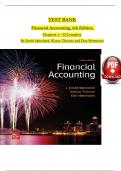Examen
TEST BANK For Financial Accounting, 6th Edition By David Spiceland, Wayne Thomas, Verified Chapters 1 - 12, Complete Newest Version
- Cours
- Établissement
- Book
TEST BANK For Financial Accounting, 6th Edition By David Spiceland, Wayne Thomas, Verified Chapters 1 - 12, Complete Newest Version TEST BANK For Financial Accounting, 6th Edition By David Spiceland, Wayne Thomas, Verified Chapters 1 - 12, Complete Newest Version TEST BANK For Financial Account...
[Montrer plus]




